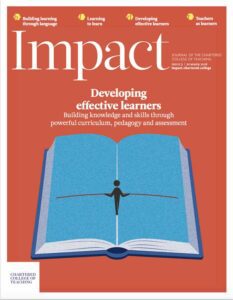Knowing your subject: The role of disciplinary knowledge in effective teaching
Written by: Mark Enser

5 min read
Changing perspectives
When I began teaching, back in 2003, I was frequently told that I was a teacher first and subject specialist second. There was a prevalent idea that we should be teaching generic transferable skills, such as evaluation or interpretation, and that our subjects were just a vehicle through which this was delivered. This was reflected in a national curriculum that was light on specific content and remote from developments at the ‘frontiers of the subject’ ((Marsden, 1997), p. 241). (For more on the place of facts, knowledge and skills within the curriculum, see (Christodoulou, 2014)).
More recently, however, there has been a growing recognition that a teacher’s subject knowledge is vitally important. In a review of research behind effective teaching, Coe et al. ((Coe et al., 2014), p. 2) found that a teacher’s subject knowledge, and their understanding of how pupils handle this subject, has strong evidence of impact on student outcomes.
We can see this
Join us or sign in now to view the rest of this page
You're viewing this site as a guest, which only allows you to view a limited amount of content.
To view this page and get access to all our resources, join the Chartered College of Teaching (it's free for trainee teachers and half price for ECTs) or log in if you're already a member.
This article was published in February 2018 and reflects the terminology and understanding of research and evidence in use at the time. Some terms and conclusions may no longer align with current standards. We encourage readers to approach the content with an understanding of this context.
5
1
vote
Please Rate this content
Subscribe
Please login to comment
0 Comments
Oldest
Newest
Most Voted
Inline Feedbacks
View all comments










